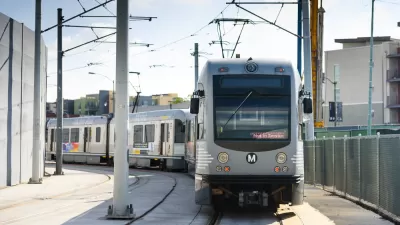Rail projects throughout the U.S. are hard hit by the downturn in the economy. The agencies behind them are trying to find ways to keep the projects from falling apart.
From L.A. to Detroit to Charlotte, local transit agencies are trying to adapt to an unlucky economy. Some are finding creative ways to keep rail projects afloat.
"L.A.'s Metropolitan Transportation Authority is deep into a drawn-out and expensive light-rail construction project: It's a 15.2-mile route known as the Expo Line, which will be the first rail connection between downtown and the populous Westside of Culver City and Santa Monica. Its first phase, an 8.5-mile segment, is under construction and slated to begin operations later this year. The second phase, however, has a future that's increasingly unclear.
Both phases of the project have relied heavily on a transportation fund created by voter-approved bond sales. But in an attempt to close budget holes, the state halted bond sales this spring. That essentially pulled $174 million of expected money out of Metro's pockets. And if things don't shape up soon, the state could be halting bond sales again in the fall, which will take another $400 million out of play. Such a decision would likely mean delays to phase two of the Expo Line, which had been expected to begin operations in 2015."
FULL STORY: Uneasy Rider

Montreal Mall to Become 6,000 Housing Units
Place Versailles will be transformed into a mixed-use complex over the next 25 years.

Planetizen Federal Action Tracker
A weekly monitor of how Trump’s orders and actions are impacting planners and planning in America.

DARTSpace Platform Streamlines Dallas TOD Application Process
The Dallas transit agency hopes a shorter permitting timeline will boost transit-oriented development around rail stations.

Without International Immigrants, the Rural US Population Would Be Falling 58%
Census data shows that population growth in rural areas is due in large part to international migrants.

Dead End: Nine Highways Ready for Retirement
The Freeways Without Futures report describes the nation’s most promising highway removal proposals.

Congressman Proposes Bill to Rename DC Metro “Trump Train”
The Make Autorail Great Again Act would withhold federal funding to the system until the Washington Metropolitan Area Transit Authority (WMATA), rebrands as the Washington Metropolitan Authority for Greater Access (WMAGA).
Urban Design for Planners 1: Software Tools
This six-course series explores essential urban design concepts using open source software and equips planners with the tools they need to participate fully in the urban design process.
Planning for Universal Design
Learn the tools for implementing Universal Design in planning regulations.
City of Mt Shasta
City of Camden Redevelopment Agency
City of Astoria
Transportation Research & Education Center (TREC) at Portland State University
City of Camden Redevelopment Agency
Municipality of Princeton (NJ)
Regional Transportation Commission of Southern Nevada





























